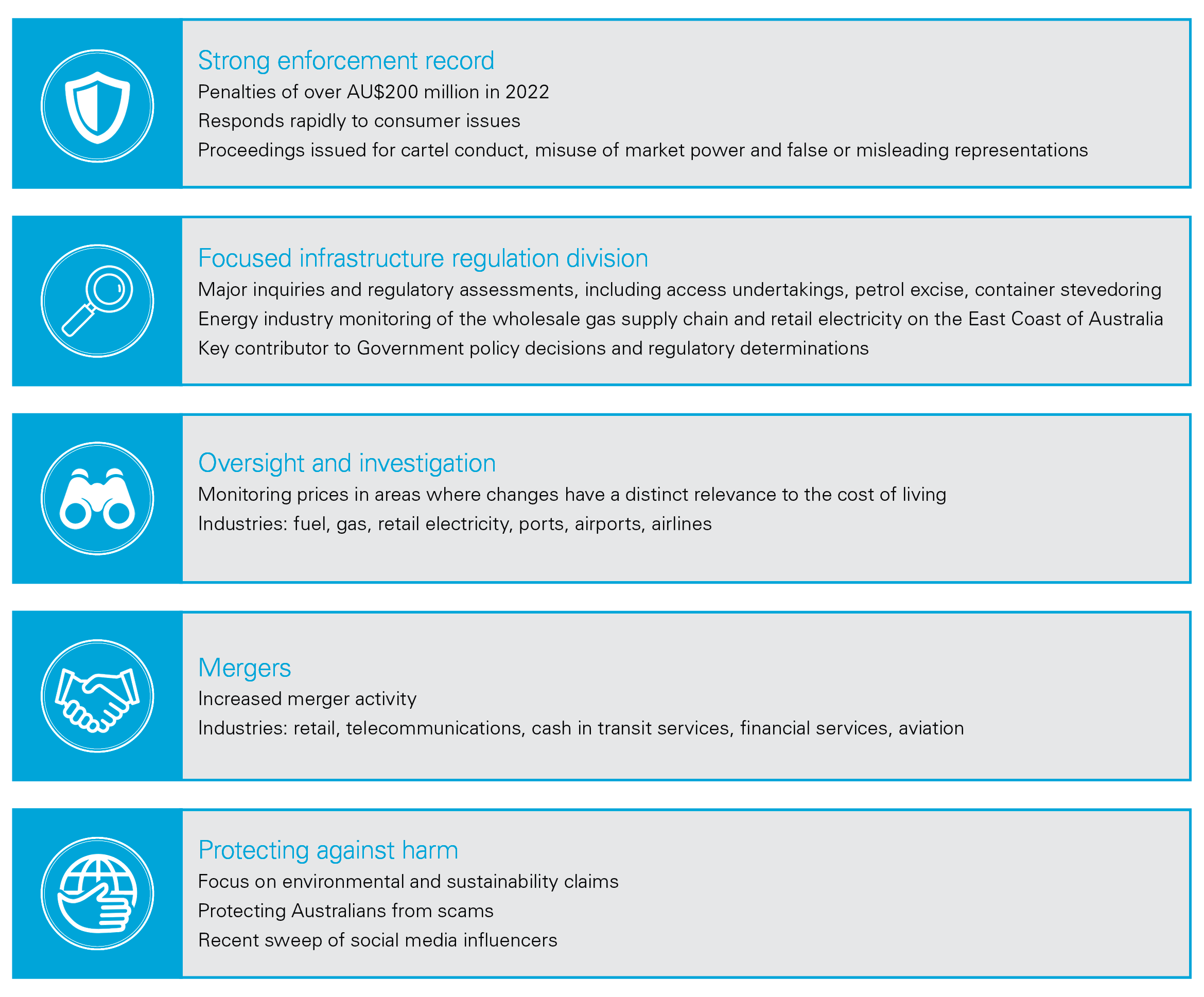
The ACCC’s remit is diverse and extensive.
The breadth of work undertaken by the Australian Competition and Consumer Commission (ACCC) and an insight into in the competition regulator's focus for the year ahead was highlighted in Chair Gina Cass-Gottlieb's opening address to the Senate Economics Committee last week. As the Federal Government continues to lean on the ACCC to undertake sector inquiries, enforce its gas price cap, contribute to protecting Australians from scams, in addition to its enduring mandate to protect consumers and ensure the functioning of competitive markets that "enhances the welfare of Australia now and into the future"1, the ACCC continues to play an increasingly prominent role in shaping markets in Australia.
ACCC update to Senate estimates
In her address to the Senate Estimates Committee, the Chair highlighted the ACCC's current role, outcomes and focus:
Current state of play
Sector inquiries
The ACCC will always operate to fulfil the legislative mandate of promoting competition and protecting consumers under the Competition and Consumer Act 2010 (Cth) (CCA). These obligations also provide an avenue for the Minister to direct the ACCC to undertake inquiries. Most recently, the Minister has added to the review of childcare, insurance in Northern Australia and the significant and ongoing inquiry into digital platforms, an inquiry into the deposit interest rates and rate setting decisions of banks.2 This is in addition to its ongoing monitoring of the gas and retail electricity sectors.
Merger clearance
The addition of a new sector inquiry comes at a time where the ACCC is reporting "increased merger activity". With eight Phase I mergers currently under public review, two mergers in the formal authorisation process, and an appeal to the Australian Competition Tribunal of the ACCC's decision to not authorise the mobile infrastructure and spectrum sharing arrangements between Telstra and TPG,3 in addition to those assessed confidentially, the ACCC may be rebutting the global trend of a decrease in merger filings.4
Enforcement
The protection of consumers against scams,5 misleading environmental claims6 and manipulative marketing techniques by social media influencers7 has been the driver for the ACCC's recent sweeps of websites and social media platforms. The proactive approach of the regulator in protecting consumers is driving investigations in the enforcement space. This is in addition to the "number of cartel investigations underway" which the ACCC expects they should "reach a decision on them…definitely this year. Some of [those] will be criminal".8 With higher penalties now in force, and criminal sanctions still squarely in the focus of the ACCC, there is no slowing in the ACCC's approach to enforcement.
Looking ahead
The ACCC will release its priorities for the year ahead next month. Ahead of this, it is clear that the enduring priority of taking action against cartel conduct will remain, and with the recent suspended prison terms handed down to individuals in the foreign exchange price fixing case9 and intensive correction orders handed down in the Alkaloids of Australia case,10 this will ensure criminal sanctions are always explored by the ACCC.
The growing pace of energy transition will continue to drive the ACCC's proactive approach to ensuring that the public at large are not misled by "green" and sustainability claims. This protection goes beyond purely claims on consumer products, to the claims made in investor presentations, business-to-business transactions, and all other statements made in trade or commerce.
The new unfair contracts regime comes into force in November. Where businesses have had advance notice as to these changes, and the regime is now subject to significant penalties11 (rather than the unfair term merely being void), we anticipate that the ACCC will be not be afraid to take cases to set the legal parameters of the new laws.
We consider that there will be an increasing trend towards merger authorisation, where transaction imperatives require greater certainty over the clearance timeframe and a clear right of appeal to the Australian Competition Tribunal. The conversation on merger reform in Australia continues; and we expect to see the discussion over a mandatory and suspensory merger regime (among other proposed amendments) play out over the year ahead.
The ACCC will continue to be a proactive advocate for consumers and will seek to ensure markets operate effectively, especially in times of increased inflation. Inflationary pressures will likely increase the focus on companies in dominant market positions, and will turn the spotlight on the way in which businesses communicate their pricing intentions to ensure that there is no market coordination adversely affecting effective competition.
1 Ms Gina Cass-Gottlieb, Chair, Senate Estimates – 15 February 2023
2 ACCC launches inquiry into deposit interest rates | ACCC
3 Telstra Corporation Limited and TPG Telecom Limited proposed spectrum sharing | ACCC
4 White & Cases Global Antitrust Merger StatPak | White & Case LLP (whitecase.com)
5 Scams | ACCC
6 ACCC internet sweeps target 'greenwashing', fake online reviews | ACCC
7 ACCC social media sweep targets influencers | ACCC
8 L Henning, An interview with Gina Cass-Gottlieb, MLex, Antitrust, Special Report, 15 February 2023, at 9.
9 First individuals are sentenced for criminal cartel conduct | ACCC
10 Alkaloids of Australia and its former export manager sentenced in criminal price fixing cartel | ACCC
11 Australia to increase its maximum competition & consumer law penalties | White & Case LLP (whitecase.com)
White & Case means the international legal practice comprising White & Case LLP, a New York State registered limited liability partnership, White & Case LLP, a limited liability partnership incorporated under English law and all other affiliated partnerships, companies and entities.
This article is prepared for the general information of interested persons. It is not, and does not attempt to be, comprehensive in nature. Due to the general nature of its content, it should not be regarded as legal advice.
© 2023 White & Case LLP



